|
|
|
Sort Order |
|
|
|
Items / Page
|
|
|
|
|
|
|
| Srl | Item |
| 1 |
ID:
170538
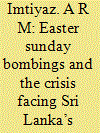

|
|
|
|
|
| Summary/Abstract |
This paper primarily examines the Easter Sunday bombing plotted and executed by a group of Sri Lankan Muslims and post-war Sri Lankan conditions among Sri Lankan Muslims, also known as Moors. The article will attempt to argue that (a) the post-war violence and organized Islamophobia among non-Muslim communities in general and the Sinhalese in particular increased fears and distrust among Sri Lankan Muslims in general; and (b) state concessions to Muslim political leaders, who supported successive Sri Lankan ruling classes from independence through the defeat of the Liberation Tigers of Tamil Eelam (LTTE) in 2009, have meant an isolation of the community from the other two main ethnic communities. The concessions that the Muslim community has won actively helped the Muslim community to be proactive in its religious practices and thus paved the way for exclusive social and political choices. The rise of Islamic movements and mosques in the post-1977 period galvanized Muslims. In time this isolation has been reinforced by socio-religious revival among Muslims whose ethnic identity has been constructed along the lines of the Islamic faith by Muslim elites. Despite this revival it has been clear that the Muslim community has been reluctant to use Islamic traditions and principles for peace building, which could have helped to ease tensions, brought about by the 30-year-old ethnic conflict. Finally, some pragmatic ways to ease tensions between Muslims and non-Muslims in the greater discipline of conflict resolution are explored using traditions within Islam.
|
|
|
|
|
|
|
|
|
|
|
|
|
|
|
|
| 2 |
ID:
145666
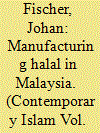

|
|
|
|
|
| Summary/Abstract |
In Arabic, halal literally means ‘permissible’ or ‘lawful’. Halal is no longer an expression of an esoteric form of production, trade and consumption, but part of a huge and expanding globalized market in which certification, standards and technoscience play important roles. Over the past three decades, Malaysia has become a world leader in the global expansion of halal markets. This has come about in large part because the state and government of Malaysia have taken on the role of halal-certifying authority within the country. In effect, it has certified, standardized and bureaucratized halal production, trade and consumption. Based on fieldwork in Malaysia, this article explores how manufacturing companies understand and practise halal certification, standards and technoscience. I argue that while existing studies of halal overwhelmingly explore micro-social aspects such as the everyday consumption among Muslim groups, ‘the bigger institutional picture’ that frames such consumption production and regulation are not well understood. By studying halal production, I provide an ethnography of the overlapping technologies and techniques of production and regulation that together warrant a product as ‘halal’ and thereby help to format the market.
|
|
|
|
|
|
|
|
|
|
|
|
|
|
|
|
| 3 |
ID:
137222
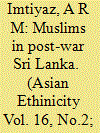

|
|
|
|
|
| Summary/Abstract |
This study attempts to understand the recent mobilization against the Sri Lankan Muslim community by Sinhala-Buddhist organizations. In doing so, it adds to the discussion about the relationship between second-order minorities and the state and how identities can be manipulated pre- and post-conflict. States, led by majority ethnic groups, may choose to work with second-order minorities out of convenience in times of crisis and then dispose of them afterwards. The article will attempt to look critically at some state concessions to Muslim political leaders who supported successive Sri Lanka’s ruling classes from the independence through the defeat of the Tamil Tigers in 2009. It will also examine the root causes of the Sinhala-Buddhist anti-Muslim campaigns. Finally, it will discuss grassroots perspectives by analysing the questionnaire on the anti-Islam/Muslim campaign that was distributed to youth, students, unemployed Muslims and workers in the North-Western and Western provinces.
|
|
|
|
|
|
|
|
|
|
|
|
|
|
|
|
| 4 |
ID:
188963
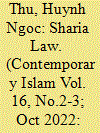

|
|
|
|
|
| Summary/Abstract |
Muslims in the Mekong River Delta are mainly ethnic Cham (one of 54 ethnicities in Viet Nam), living in An Giang Province. They adopted Islam in the early days. This religion has formed Cham characteristics in the community culture different from the Kinh (Vietnamese), Hoa (Chinese), and Khmer ethnic groups in the surrounding areas. This difference is due to the influence of religious views, especially the Islamic Sharia law. In reality, Sharia law is appropriately interpreted from the perspective of Cham Muslims, so it is simpler than the “orthodox” original law. Cham Muslims apply this simple interpretation in their religious life, especially in economic behavior and sharing benefits through their zakat practice. Based on ethnographic fieldwork in An Giang Province, this article analyzes the current understanding of Sharia law in the Cham Muslims community, the application of this understanding in economic behavior, and the fulfillment of zakat duties.
|
|
|
|
|
|
|
|
|
|
|
|
|
|
|
|
| 5 |
ID:
188964
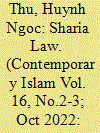

|
|
|
|
|
| Summary/Abstract |
Muslims in the Mekong River Delta are mainly ethnic Cham (one of 54 ethnicities in Viet Nam), living in An Giang Province. They adopted Islam in the early days. This religion has formed Cham characteristics in the community culture different from the Kinh (Vietnamese), Hoa (Chinese), and Khmer ethnic groups in the surrounding areas. This difference is due to the influence of religious views, especially the Islamic Sharia law. In reality, Sharia law is appropriately interpreted from the perspective of Cham Muslims, so it is simpler than the “orthodox” original law. Cham Muslims apply this simple interpretation in their religious life, especially in economic behavior and sharing benefits through their zakat practice. Based on ethnographic fieldwork in An Giang Province, this article analyzes the current understanding of Sharia law in the Cham Muslims community, the application of this understanding in economic behavior, and the fulfillment of zakat duties.
|
|
|
|
|
|
|
|
|
|
|
|
|
|
|
|
| 6 |
ID:
188965
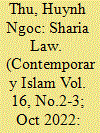

|
|
|
|
|
| Summary/Abstract |
Muslims in the Mekong River Delta are mainly ethnic Cham (one of 54 ethnicities in Viet Nam), living in An Giang Province. They adopted Islam in the early days. This religion has formed Cham characteristics in the community culture different from the Kinh (Vietnamese), Hoa (Chinese), and Khmer ethnic groups in the surrounding areas. This difference is due to the influence of religious views, especially the Islamic Sharia law. In reality, Sharia law is appropriately interpreted from the perspective of Cham Muslims, so it is simpler than the “orthodox” original law. Cham Muslims apply this simple interpretation in their religious life, especially in economic behavior and sharing benefits through their zakat practice. Based on ethnographic fieldwork in An Giang Province, this article analyzes the current understanding of Sharia law in the Cham Muslims community, the application of this understanding in economic behavior, and the fulfillment of zakat duties.
|
|
|
|
|
|
|
|
|
|
|
|
|
|
|
|
| 7 |
ID:
188966
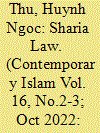

|
|
|
|
|
| Summary/Abstract |
Muslims in the Mekong River Delta are mainly ethnic Cham (one of 54 ethnicities in Viet Nam), living in An Giang Province. They adopted Islam in the early days. This religion has formed Cham characteristics in the community culture different from the Kinh (Vietnamese), Hoa (Chinese), and Khmer ethnic groups in the surrounding areas. This difference is due to the influence of religious views, especially the Islamic Sharia law. In reality, Sharia law is appropriately interpreted from the perspective of Cham Muslims, so it is simpler than the “orthodox” original law. Cham Muslims apply this simple interpretation in their religious life, especially in economic behavior and sharing benefits through their zakat practice. Based on ethnographic fieldwork in An Giang Province, this article analyzes the current understanding of Sharia law in the Cham Muslims community, the application of this understanding in economic behavior, and the fulfillment of zakat duties.
|
|
|
|
|
|
|
|
|
|
|
|
|
|
|
|
|
|
|
|
|